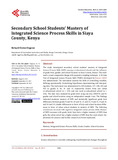Secondary School Students’ Mastery of Integrated Science Process Skills in Siaya County, Kenya
Abstract
The study investigated secondary school students’ mastery of Integrated Science Process Skills (ISPS) among co-educational schools and the influence of grade level, gender, and school location in Siaya County, Kenya. The study used a causal-comparative design with purposive sampling technique. A 30-item Test of Integrated Science Process Skill (TISPS) developed by Kazeni (2005)
was administered. The instrument assesses the skills of controlling variables, defining operationally, formulating hypotheses, experimenting and interpreting data. The instrument was administered to 429 students, 117, 108, 101 and 103 in grades 9, 10, 11 and 12 respectively drawn from one urban co-educational school (n = 215) and one rural co-educational school (n =
214). The data were analyzed by grade level using one-way ANOVA and by gender and school location using an independent sample t-test. The findings indicated moderate mastery of ISPS and statistically significant grade level differences between grades 9 and 10, 10 and 11, 11 and 12, 9 and 11, 9 and 12, and 10 and 12; Gender differences in favor of boys and school location differences in favor of urban school students in mastery of ISPS. The following conclusions are made with regard to integrated science process skills: Mastery of ISPS increases with grade level; boys have a higher mastery of ISPS than girls; the urban school has a higher mastery of ISPS than the rural school. Implications for practice and further research are herein explicated.

